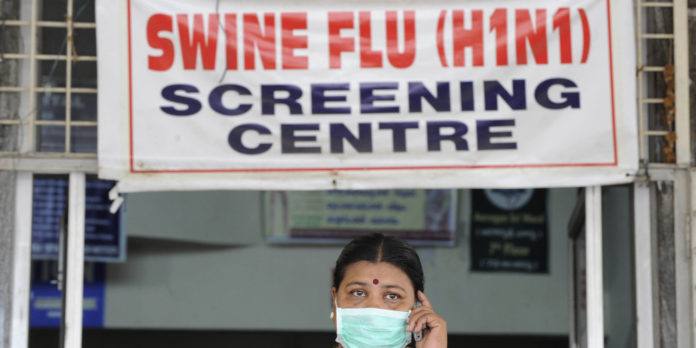
More than 1,100 people in India have died from swine flu, health officials said Monday, as an outbreak that began in mid-December continues to spread rapidly through the country’s dense population.
India’s Health Ministry said 20,795 people have been infected with swine flu in 2015, of whom 1,115 have died. Officials said the virus usually increases during a monsoon, but they could not say whether the recent heavy rainfall in Delhi and other parts of the country’s north would have any impact on the current H1N1 virus pandemic, the Times of India reported. They have, however, said they are not expecting a decrease in the incidence of the virus due to the rain.
The state of Gujarat has the highest death toll, with 275 dead from the disease, the Times article said. That is followed by Rajasthan with 267 deaths and Madhya Pradesh with 160 deaths. Rajasthan has the highest number of confirmed cases, with 5,610, followed by Gujarat with 4,614 cases and Delhi with 2,999 cases.
Doctors attribute the unusually high number of casualties this flu season to infected people delaying hospital visits. Medical professionals are urging anyone who feels symptoms – including chills, coughing, fatigue, fever and headache – to seek immediate care. Health officials have also launched an education campaign over television and radio to instruct citizens on how to shield themselves from the virus, which can spread through the air (vie coughing or sneezing) and through contact with infected surfaces.
There are also reports that the virus has become more aggressive, and may have acquired resistance against oseltamivir, the main antiviral used to treat H1N1. “As far as we recognize, significant [genetic] changes have not occurred with H1N1 viruses circulating in the world, but my concern is that such changes have occurred in India,” Masato Tashiro, a Tokyo-based director at Japan’s National Institute of Infectious Diseases, told Bloomberg News.
In response to the uptick in deaths, Maharashtra state Chief Minister Devendra Fadnavis announced his state will treat all swine flu patients free of charge, the Times reported. “I have issued instructions to the public health department to ensure completely free treatment of H1N1 patients in private hospitals across the state,” he told the newspaper. “They cannot refuse swine flu treatment to anyone and the government will bear the entire cost of such treatment.” Of the 1,789 cases reported in Maharashtra, 152 have resulted in death.
Rajasthan Health Minister Rajendra Singh Rathore announced during a state assembly that all government hospitals would provide free face masks to patients who test positive for the H1N1 virus, India news site NDTV reported. He also shot down questions suggesting there had been negligence by medical staff at government hospitals. Rajasthan declared a swine flu epidemic earlier in February.
While the government has said that there is plenty of medicine available to treat H1N1, hospitals have reported shortages—potentially due to individuals stockpiling the drug as the outbreak worsens.
India experienced a similar H1N1 pandemic in 2009 and the pandemic this year has been India’s worst resurgence since. In the last pandemic, more than 2,700 people in India died from May 2009 to December 2010. Globally, pandemic influenza H1N1 was responsible for nearly 18,500 deaths in the 2009-2010 flu season.
